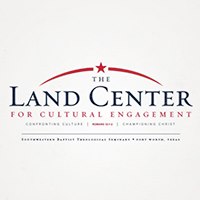Last Friday July 10, I participated in the Land Center Young Scholars’ Competition. This colloquium was a unique opportunity for graduate students to compete for prizes in front of an accomplished scholar in the field and receive generous but significantly helpful feedback. It was put on by the Land Center for Cultural Engagement at Southwestern Baptist Theological Seminary.
Seven PhD students or recent PhD graduates presented papers on topics that intersected with their PhD emphasis and the area of faith, work, and economics. We turned in an academic paper before the competition, which was scored by two different philosophy professors from Southwestern. The presentation, by contrast, was to be aimed at an informed lay-audience, with an interesting topic and an engaging presentation style. There were prizes for first, second, and third place.
The main adjudicator was Jay Richards, Distinguished Fellow of the Institute for Faith, Work, & Economics and a Senior Fellow of the Discovery Institute where he works with the Center on Wealth, Poverty and Morality. It was enjoyable to meet Jay, who was pretty relaxed and gave kind and beneficial feedback to each of us. It was evident Jay is well-read in many fields beyond even those he has written extensively in. We students also scored each others’ papers. The total score for each student came from the paper score, Jay’s score, and the students’ peer score. Other professors present to add feedback to Jay’s were Evan Lenow, Director of the Land Center and Associate Professor of Ethics at Southwestern Seminary, and John Wilsey, Assistant Professor of History and Christian Apologetics at Southwestern Seminary and Associate Director of the Land Center.
The seven presenters and topics were as follows.
Paul Golata (Southwestern Seminary) argued that we must be truth-tellers about God’s story of redemption in our work and that we must treat the advancement of technology appropriately as tools to be appropriated for proper work, but not for idolatry or redemption itself.
Stephen DeKuyper (Southern Seminary) argued that “Christian businesses” can exist and discussed what their mission, vision, and values may look like.
Todd Scacewater (myself) (Westminster Theological Seminary) discussed the biblical concept of poverty as including three aspects–lack of monetary wealth, socio-political oppression, and spiritual disposition–and argued that we should apply this biblical concept of poverty to poverty alleviation efforts today to be more effective in the short- and long-term.
Spence Spencer (Southeastern Seminary) argued that work is not intrinsically valuable, having value because of its being, but inherently valuable. He relied on C. I. Lewis’ definitions of intrinsic, instrumental, and inherent value, with inherent value being its value when properly ordered in relation to other objects it is intended to be in relation with.
Gregory Lamb (Southeastern Seminary) discussed the “death and dying industry.” He presented a New Testament theology of death and dying and argued that pastors should be far more involved in knowing the laws related to issues such as burial, funerals, etc., in order to walk grieving ones through the death process.
Graham Floyd (PhD, Southwestern Seminary) argued that economics is part of God’s created order, and economic principles should be grounded in virtues, which can be demonstrated in the Decalogue.
Joshua Peeler (New Orleans Seminary) discussed the life of Thomas Chalmers and his response to social issues of his day. He argued that the church today should take away lessons from Chalmers’ approach to social engagement, including his style of preaching and the issues he addressed in his preaching.
Joshua Peeler won the competition and the fat first place prize: congratulations Joshua!
I’d like to thank the Land Center for accepting me into the competition and generously hosting us. My thanks also go out to Trey Dimsdale, Associate Director of the Land Center, for administrating the conference superbly, and Rob Collingsworth, who ran many of the logistics. I would recommend this competition next year to anyone interested in the area of faith, work, and economics. The field is burgeoning and has incredible potential for making churches, seminaries, and families more holistic in their approach to human well-being and society flourishing, and almost all those involved in the field have told me there is a great amount of room for biblical scholars to contribute.

